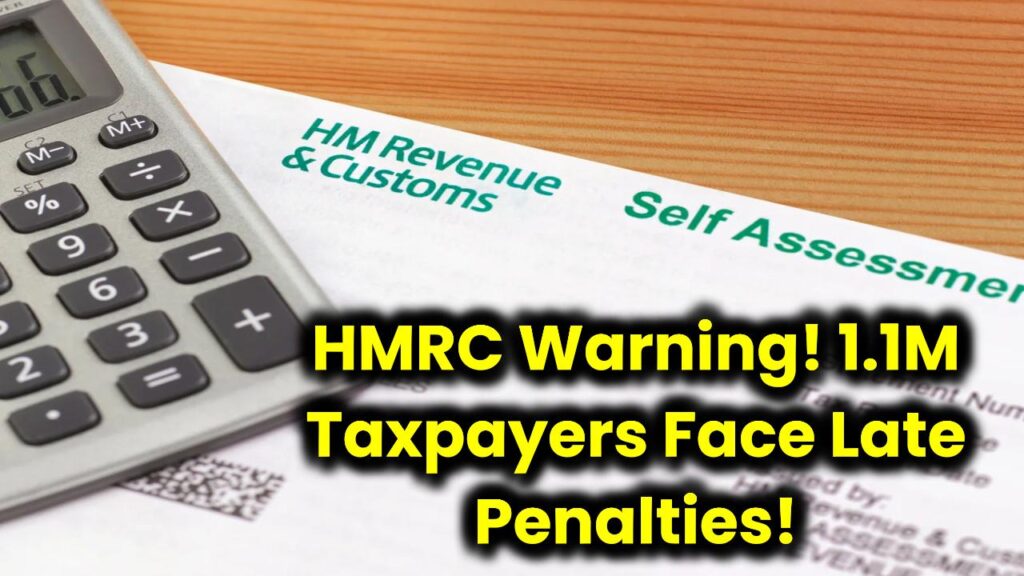
HMRC Alert: Late tax returns can be costly, and HMRC has issued a stark reminder that more than 1.1 million UK taxpayers now face penalties for missing the 31 January 2025 self-assessment deadline. If you haven’t filed your return yet, you might be wondering what happens next and how to avoid additional fines.
This article breaks down what you need to know, including penalty details, how to appeal, and what steps to take if you still need to file your tax return. Whether you’re a freelancer, self-employed, or a high earner caught in the tax threshold freeze, understanding these penalties is crucial.
HMRC Alert: Taxpayers Face Penalties
| Topic | Details |
|---|---|
| Missed Deadline | Over 1.1 million taxpayers missed the 31 January 2025 deadline. |
| Initial Penalty | A £100 fine applies immediately upon missing the deadline. |
| Ongoing Penalties | Daily fines of £10 after 3 months, up to £900. |
| Additional Charges | Further fines at 6 and 12 months, 5% of tax due or £300. |
| Interest on Unpaid Tax | Interest starts at 7.25%, increasing to 8.75% in April 2025. |
| Appeal Options | You can appeal if you have a reasonable excuse (e.g., illness, bereavement). |
| Time to Pay | Installment plans available via HMRC’s “Time to Pay” scheme. |
| Common Mistakes | Incorrect figures, missing documents, and forgetting deductions. |
| Tax-saving Tips | Keep records, claim deductions, use tax-efficient investments. |
| Official HMRC Website | Visit HMRC for more details. |
If you’ve missed the deadline, the best thing to do is act quickly. File now, even if you can’t pay in full, to stop further penalties. If you’re struggling, set up a payment plan with HMRC. Ignoring it will only make things worse.
What Happens If You File Your Tax Return Late?
If you missed the 31 January deadline, here’s what to expect:
- Immediate £100 Fine – This applies to all late submissions, even if you owe no tax.
- Three-Month Delay – HMRC will begin charging £10 per day after three months, capping at £900.
- Six-Month Delay – A penalty of 5% of the tax due or £300, whichever is higher.
- Twelve-Month Delay – Another 5% of unpaid tax or £300 charge.
- Additional Interest – Unpaid tax will accrue interest, starting at 7.25% (set to increase in April 2025).
Example: If you owe £5,000 in tax and fail to file for a year, your penalty could exceed £1,600, not including interest!
Why Are So Many People Affected?
The rising number of late filers is partly due to frozen tax thresholds since 2022, pushing more people into self-assessment. Even if you haven’t needed to file before, earning over £100,000, having side income, or being self-employed could require you to submit a tax return.
Common Mistakes That Lead to Late Filing
Many taxpayers face penalties due to avoidable errors. Here are some common mistakes to watch out for:
- Procrastination – Waiting until the last minute increases the risk of missing the deadline.
- Incorrect Figures – Always double-check your income and deductions.
- Missing Documents – Gather all necessary financial records well in advance.
- Forgetting Allowances and Deductions – You might overpay if you don’t claim tax reliefs.
- Not Registering for Self-Assessment – If you’re newly self-employed, you must register before filing.
How to Minimize or Avoid Penalties
If you’ve missed the deadline, here’s what to do immediately:
1. File Your Tax Return ASAP
- Visit HMRC’s online self-assessment portal.
- Use HMRC’s online calculator to estimate your penalties.
- Submit your return, even if you can’t pay the full amount yet.
2. Pay What You Can
- If you owe tax, pay as much as possible to reduce interest charges.
- Log into your HMRC account and choose a payment method.
3. Set Up a Payment Plan (Time to Pay Scheme)
- If you can’t pay in full, set up an installment plan through HMRC.
- You must owe less than £30,000 and be able to pay within 12 months.
4. Appeal If You Have a Reasonable Excuse
If an emergency prevented you from filing, you can appeal the penalty. Valid reasons include:
- Serious illness (hospitalization, mental health crises)
- Death of a close family member shortly before the deadline
- IT failures on HMRC’s website
- Unexpected financial hardship
To appeal, visit HMRC’s appeal page and submit supporting evidence.
FAQs On HMRC Alert
1. How Much is the HMRC Late Filing Penalty?
The initial penalty is £100, followed by additional fines after 3, 6, and 12 months.
2. What Happens If I Can’t Afford to Pay My Tax Bill?
You can apply for a payment plan through HMRC’s Time to Pay scheme to spread out payments over time.
3. Can HMRC Waive My Penalty?
Yes, but only if you have a valid excuse such as severe illness or technical issues preventing submission.
4. Will HMRC Take Legal Action for Late Tax Returns?
If you ignore penalties and unpaid tax, HMRC can enforce collection through bailiffs or court action.
5. How Can I Avoid This in the Future?
- Set up email and SMS reminders from HMRC.
- File your return well before the deadline.
- Use an accountant or tax software to streamline the process.







